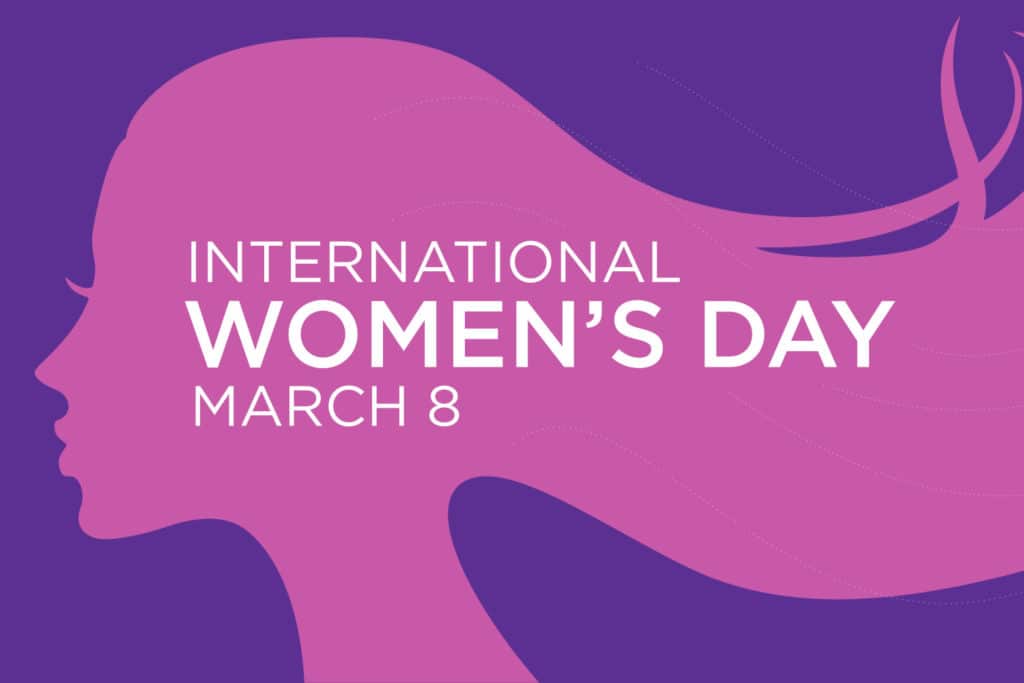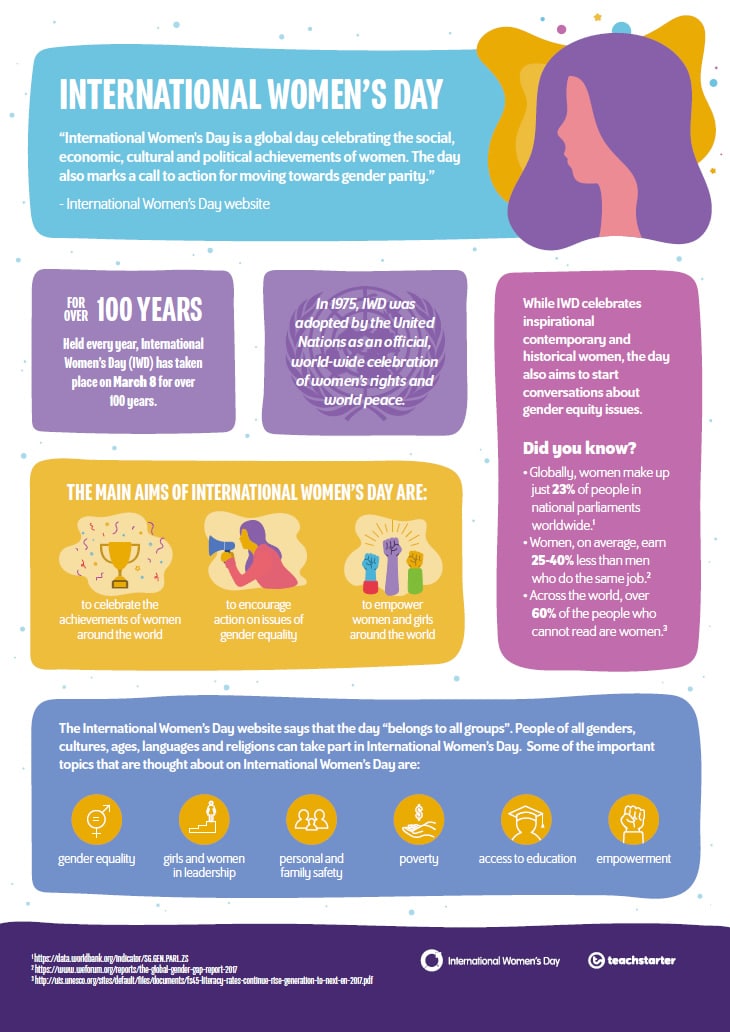International Women’s Day 2020 highlights equality, it’s not just about the pay gap.
Equality issues between men and women have been around for a long time, don’t stop reading, it’s not a political rant. You would think that by 2020 we had probably got the issues sorted and were all working together with everyone, no matter what their gender, on an equal footing. Sadly, it is not the case, there may have been massive improvements in many areas and many countries, but there is still enough of an imbalance for International Women’s Day to pick equality as their theme for 2020.
International Women’s Day is nothing new, it began with the first National Women’s Day in the United states back in 1908. The first international gathering was in 1911 and has been celebrated annually on March 8th every year. It is all about unity, no one organisation is solely responsible for it, IWD is a global collective celebrated from small businesses and schools through to the United Nations who hold and annual observance.
What does this have to do with a blog that is generally about health and wellbeing? You might be surprised, there is a lot of relevance. This year’s theme is equality, with the slogan ‘I am Generation Equality. Their campaign for this year is #EachforEqual and is all about ‘Collective Individualism.’ They say ‘We are all parts of a whole. Our individual actions, conversations, behaviours and mindsets can have an impact on our larger society.’ We can all be ourselves and at the same time be a collective for change and have an impact that reaches out through society.
‘We are all parts of a whole. Our individual actions, conversations, behaviours and mindsets can have an impact on our larger society.’ International Women’s Day.
It is not just about gender pay gaps, working conditions or cultural issues, it is also about equality in health. You may think that in the 21st century that we are all on a level base when it comes to health. We have many advances in medicine, a greater awareness of lifestyle and dietary impact on our health and greater access to clean water and sanitation.
However, there are still a number of areas of health where there is still inequality between men and women. We are all about maintaining good health and prevention, so it makes sense to be aware of what issues might be more prevalent and see if there are steps we can take to make a difference. This is not just about women looking after themselves, it is just as relevant if you are male and know a woman that could be affected by health issues. Perhaps you are the one that can make a difference with support and advice.
Inequality between genders is not just about pay and cultural issues, it is about health too,
In 2018 the British Medical Association (BMA) published a paper looking at the inequalities that occurred when it came to women and health. Their key findings were that there were ‘marked and persistent health inequalities across the United Kingdom in both the length of life and length of healthy life, for both men and women.’ These related to socio-economic status, ethnicity and geographical regions. In fact, the trend in increased life expectancy for women has been slowly dropping during the last ten years.
The Scottish Public Health Observatory has looked at a number of conditions and considered their prevalence by sex. It makes interesting reading, for example incidence of asthma is higher in women, auto immune disorders including rheumatoid arthritis are more common in women. Self-reported mental health issues are almost equal for men and women, but there is a higher prevalence of mental ill health amongst women. The incidence of stroke is higher for men, but the mortality rate is higher for women.
There are also many hormone related issues that will affect women and not men, awareness of the perimenopause is growing and how it affects women in their daily lives and employment. It may not be considered an illness, but the hormonal changes, some of which impact for a number of years, have a knock-on effect into the workplace and at home. In fact, being aware of the perimenopause rather than just the menopause and the cessation of periods, is increasing rapidly and by preparing and having the right knowledge can help women understand what their body is going through. The Perimenopause Hub is a great resource for all aspects of health and wellbeing regarding this stage of life.
How can we help look after ourselves and aim to make a difference and balance the inequality in health issues? As many women are often the primary source of care and support for many families, she is often the last on her list of priorities. Think about it, she should be number one on her list, if she isn’t well, those that she looks after will be even more compromised.
Women are often the key primary care giver, if they don’t look after themselves, there is an impact on all of those around them.
A healthy and balance diet, especially regular eating, is key to underpin good health. Drinking water and herbal teas rather than surviving on strong coffee and endless cups of tea, can have a big and positive impact.
Good health is something that is ongoing, not just waiting until you get ill. Creating wellness is far better than trying to heal an illness.
Taking time out to relax, destress or simply have half an hour away from responsibilities, screens and demands, can have a very big and positive impact. It’s okay to do nothing or to do something that brings you pleasure, for a time.
A good all round multi nutrient formulation can give a good nutritional foundation. B vitamins and magnesium help support the functioning of the nervous system and proper psychological health. They also help reduce tiredness and fatigue. Look for a multi with a good B complex or choose a separate B complex. Another tip is to make sure the B vitamins are in their most available and active forms.
If sleeping is an issue, 5HTP, a precursor to Tryptophan is a useful supplement. Tryptophan helps the production of serotonin and can help support good quality sleep,
Good hormonal health is needed for balance in the body, both physically and mentally. Borage oil is a rich source of the essential fatty acid GLA. GLA plays a role in helping to balance hormones as well as being good for skin health too. An ideal supplement to add to a multi nutrient formulation as the vitamins and minerals will support the essential fatty acid.
Many women tend to suddenly think about bone health when they get close to the menopause and a drop in oestrogen levels can lead to bone health conditions such as osteoporosis and osteopenia (pre-osteoporosis.) Bones are living tissue, so need to be supported throughout life, especially when we are at peak bone building age, pre 35. Minerals such as calcium, magnesium, zinc and boron all play a role in bone health.
Vitamin D is important too, not only for the absorption of the minerals into the bone, but research is showing that Vitamin D plays a role in many areas including the immune system, mood balance and hormonal health.
Cardiovascular health can be supported by ensuring a good intake of antioxidants through the diet and supplements. Vitamins C and E, and the mineral selenium are all important. Magnesium is used for muscle function, particularly that of the cardiac muscles. Magnesium orotate is a specific form of magnesium that can form part of a healthy heart regime.
There is no quick fix to a lot of inequalities, whether health or otherwise, but the good news is that we can support many aspects through good diet and nutrition and taking the time to give ourselves, whatever our gender, some quality TLC.


